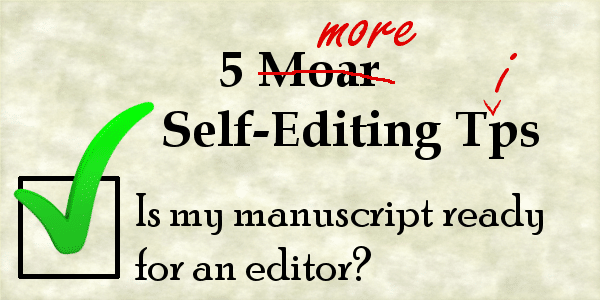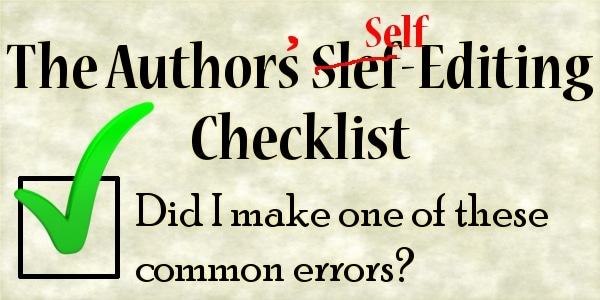
A while back a gave a list of tips for authors who wanted to edit their own work before sending it out to an editor. Well, here are 5 more tips for those of you who want to make your best effort at fixing your own manuscripts before pawning the work off on someone else.
Read Your Draft Aloud
This one is time consuming, but can potentially be the most valuable tool for editing your own work. By reading aloud, you’re going to force yourself to look at every word and hear how they go together. You’ll catch awkward phrasing, missing words, or sentences that just come across as odd. Be sure to keep reading along though, because if your eyes go wandering, you’ll read what you meant to write without noticing that it’s not what you’ve actually written.
If this seems like too much work (and frankly, it’s a lot of work), then at least read your dialogue aloud. Narration and dialogue have different sounds to them, and you want to make sure that your characters sound like people and not passages of narration.
In either event, if you’re ever going to consider audio books, someone is going to have to read them. At least take pity on that poor person down the road, and make sure it is readable aloud.
Distract Yourself
What you’ve written might not be a polished, finished product, but ideally it’s still entertaining in its draft form. This is both a blessing and a curse when editing. On the upside, you’re getting to re-read a story you hopefully enjoyed writing. On the downside, you don’t want to get so caught up in it that you breeze along, missing things in the process.
Find something to distract yourself. Keep the TV on. Check Twitter or Facebook. Whatever it takes to break your concentration sporadically. If you have to go back and re-read a paragraph here or there because you lost your place, all the better. That paragraph got looked at twice. The important thing is to make sure every word gets looked at, checked, and to the best of your ability, verified for spelling, grammatical correctness, and conveying the meaning you meant to convey.
Check Prior References
Any time you make mention of a fact, there is the chance that you contradicted something you said earlier. Your protagonist’s eyes are blue … but were they blue back in Chapter 2? Better go check. Someone is carrying pages torn from a book. Did you remember to have someone tear them out in the library scene? Double-check. One of your characters is being chased down the hall. Didn’t he have a sprained ankle from jumping off a balcony? Verify, and make mention of a limp.
This is continuity checking. It can save you the pain of incredulous 2- and 3-star reviews from people who catch those sorts of errors (I’d like to think they wouldn’t warrant 1-star ratings …). If you have enough readers, people are going to catch these things. If they are key to the plot, you could lost readers that might otherwise move on with you to subsequent works.
Continuity matters.
Look Up Esoteric Words
If you’ve gone a little highfalutin in your language, you should be careful that you are using the words correctly. Even words you may have adopted into your normal speech may carry connotations or subtleties that you might not always worry about, but which should be used correctly in a published work. The more audacious you are with your language, the more perspicacious you need to be in looking up proper usage.
People will only know you had to look up a word to be sure what it means if you didn’t do it.
Ask If Sentences/Paragraphs Add to the Story
Have you ever paid an editor? If you have, this one will make some intuitive sense. If you haven’t, know this: they generally charge by the word or page.
Why are you going to pay someone to edit excess bits of story that don’t need to be there? You’re wasting their time and your money. Of course, if you don’t know something needs to go, that’s fine. Your editor can identify that sort of thing for you (depending on the type of editing you’re getting). But if you can snip out unneeded bits of your manuscript, you’re not only improving the finished work, you’re doing it before you have to pay someone to edit them.
Ask yourself if this paragraph/sentence/clause …
- is redundant.
- adds to the story.
- could be combined with another.
- is telling rather than showing.
- belongs in this section.
- could be handled just as well in summary.
You may find, depending on your style, that you can save a significant amount on your editing by catching these things before an editor has to hit your over the head with them.


0 Comments